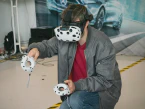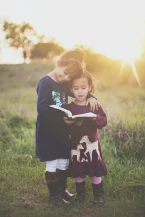Labeling Parable Lesson

The Parable of the Farmer: A Lesson in Labeling Situations
There’s an ancient parable that has stuck with me for the last 20 years. It’s about a farmer who lost his horse, and his neighbors came over to offer condolences. But the farmer replied, “Good or bad, hard to say.”
Days later, the horse returns, bringing with it seven wild horses. The neighbors congratulated the farmer on his newfound wealth, but the farmer again replied, “Good or bad, hard to say.”
Then, the farmer’s son rode one of the wild horses and broke his leg. The neighbors expressed their sympathy, but the farmer once again replied, “Good or bad, hard to say.”
Eventually, officers came knocking on doors, looking for men to draft for an army. But when they saw the farmer’s son and his broken leg, they passed him by. Again, the neighbors said, “Oh, that’s great luck!” And the farmer replied, “Good or bad, hard to say.”
To me, the story isn’t about always looking on the bright side or waiting to see how things turn out. It’s about the danger of labeling a situation as good or bad and putting concrete around it through judgment. Reality is much more fluid, and the labels of good and bad often come from incomplete stories that we tell ourselves.
This parable has been my warning that by holding onto the story of good or bad, I closed down my ability to truly see a situation. I learn more when I proceed with curiosity and wonder, rather than a fixed judgment.
The Parable of the Farmer: A Lesson in Labeling Situations
There’s an ancient parable about a farmer who lost his horse. And when neighbors came over to say, “Oh, that’s too bad,” the farmer said, “Good or bad, hard to say.”
Days later, the horse returned and brought with it seven wild horses. And neighbors came over to say, “Oh, that’s so good!” But the farmer just shrugged and said, “Good or bad, hard to say.”
Then the next day, the farmer’s son rode one of the wild horses, was thrown off and broke his leg. And the neighbors said, “Oh, that’s terrible luck.” But the farmer said, “Good or bad, hard to say.”
Eventually, officers came knocking on people’s doors, looking for men to draft for an army, and they see the farmer’s son and his leg and they pass him by. And neighbors say, “Ooh, that’s great luck!” And the farmer says, “Good or bad, hard to say.”
I first heard this story 20 years ago, and I have since applied it 100 times. To me, the story is not about looking on the bright side or waiting to see how things turn out. It’s about how eager we can be to label a situation, to put concrete around it by judging it. But reality is much more fluid, and good and bad are often incomplete stories that we tell ourselves.
The parable has been my warning that by gripping tightly to the story of good or bad, I closed down my ability to truly see a situation. I learn more when I proceed and loosen my grip and proceed openly with curiosity and wonder.
But seven years ago, when I was pregnant with my first child, I completely forgot this lesson. I believed I knew wholeheartedly what was good. When it came to having kids, I thought that good was some version of a super baby, some ultra-healthy human who possessed not a single flaw and would practically wear a cape flying into her superhero future.
I took DHA pills to ensure that my baby had a super-high-functioning, super-smart brain, and I ate mostly organic food, and I trained for a medication-free labor, and I did many other things because I thought these things would help me make not just a good baby, but the best baby possible.
When my daughter Fiona was born, she weighed 4 pounds, 12 ounces, or 2.15 kilograms. The pediatricians said there were only two possible explanations for her tinysize. “Either,” he said, “it’s bad seed,” “or it’s bad soil.” And I wasn’t so tired from labor to lose the thread of his logic: my newborn, according to the doctor, was a bad plant.
Eventually, I learned that my daughter had an ultra-rare chromosomal condition called Wolf-Hirschhorn syndrome. She was missing a chunk of her fourth chromosome. And although my daughter was good, she was alive, and she had brand new baby skin and the most aware onyx eyes, I also learned that people with her syndrome have significant developmental delays and disabilities. Some never learn to walk or talk.
I did not have the equanimity of the farmer. The situation looked unequivocally bad to me. But here’s where the parable is so useful, because for weeks after her diagnosis, I felt gripped by despair, locked in the story that all of this was tragic.
Reality, though - thankfully - is much more fluid, and it has much more to teach. As I started to get to know this mysterious person who was my kid, my fixed, tight story of tragedy loosened.
How the Parable of the Farmer Teaches Us to Label Situations
We all face challenges and unexpected situations in our lives, but how we label and interpret them can greatly affect our perspective and ultimately our success. The Parable of the Farmer is a great example of this concept.
In the parable, a farmer’s horse runs away, causing his neighbor to comment, “What bad luck!” The farmer responds, “Maybe.” The next day, the horse returns with three wild horses, and the neighbor exclaims, “What great luck!” The farmer again responds, “Maybe.” Later that week, the farmer’s son is thrown off one of the wild horses and breaks his leg. The neighbor once again comments, “What bad luck!” And again, the farmer simply responds, “Maybe.”
The following week, the army comes to the village to draft young men into the military, but the farmer’s son is exempted due to his injury. The neighbor comments, “What great luck!” And once more, the farmer responds, “Maybe.”
This simple story shows us how important it is to not immediately label a situation as good or bad. Instead, it’s better to take a step back and wait for the situation to fully develop before making a judgment. We never know what good or bad can come from a situation, and labeling it too early can cause unnecessary stress and anxiety.
It’s also important to note that labeling a situation as good or bad is subjective and can vary from person to person. What one person may see as a negative situation, another person may see as an opportunity for growth and learning.
So the next time you face a challenging situation, remember the Parable of the Farmer and try not to label it too quickly. Take a step back and see how the situation unfolds before making a judgment. Who knows, it may turn out to be a blessing in disguise.
The Parable of the Farmer: A Lesson in Labeling Situations
Have you ever found yourself in a situation where something happened, and you immediately labeled it as either “good” or “bad”? What if I told you that such a labeling process could be limiting and prevent you from seeing the bigger picture?
In the parable of the farmer, a farmer’s horse ran away, and the villagers came to commiserate with him. “That’s terrible,” they said. The farmer replied, “Maybe.” The next day, the horse returned with three wild horses, and the villagers came to congratulate him. “That’s fantastic,” they said. The farmer replied, “Maybe.”
A few days later, the farmer’s son tried to ride one of the wild horses, but he was thrown off and broke his leg. The villagers came to commiserate with the farmer once again. “That’s terrible,” they said. The farmer replied, “Maybe.”
The following week, the army came to the village, and they were conscripting all able-bodied young men to go to war. However, the farmer’s son was exempted because of his broken leg. The villagers came to congratulate the farmer once again. “That’s fantastic,” they said. The farmer replied, “Maybe.”
The parable of the farmer teaches us that we should not be too quick to label a situation as either “good” or “bad” because we never know how events will unfold in the future. What appears to be a disaster may turn out to be a blessing in disguise, and vice versa.
So, the next time something happens, try not to rush into labeling it. Take a step back and consider all the possible outcomes. Who knows? Maybe the situation you thought was “bad” will turn out to be the best thing that ever happened to you.
The Parable of the Farmer: A Lesson in Labeling Situations
Labeling situations is something we all do, often without even realizing it. We put situations into categories, labeling them as good or bad, right or wrong, positive or negative. However, what we fail to consider is that the same situation can be interpreted differently by different people, and the labels we give to it can influence our actions and emotions.
The parable of the farmer is a great example of this. The story goes that a farmer’s horse ran away, and his neighbor came over to sympathize with him. The farmer replied, “Who knows what’s good or bad?” The next day, the horse returned, bringing with it a wild horse. The neighbor came over again, this time to congratulate the farmer on his good fortune. The farmer replied, “Who knows what’s good or bad?”
A few days later, the farmer’s son was riding the wild horse and fell off, breaking his leg. The neighbor came over once again, this time to express his sympathy. The farmer’s reply was, “Who knows what’s good or bad?”
A week later, the army came to the village, looking to conscript able-bodied young men to fight in a war. The farmer’s son was exempted from service because of his broken leg. The neighbor came over one last time to congratulate the farmer on how well things had turned out. Once again, the farmer replied, “Who knows what’s good or bad?”
This story teaches us that it’s important not to label situations too quickly. What may seem like a bad situation at first can turn out to be a blessing in disguise, and vice versa. By withholding judgment and keeping an open mind, we can avoid unnecessary stress and anxiety.
The next time you’re faced with a difficult situation, try to remember the parable of the farmer. Don’t be too quick to label it as good or bad. Instead, take a step back and try to see the bigger picture. Who knows what’s good or bad? Maybe the situation will turn out to be a blessing in disguise.
The Parable of the Farmer: A Lesson in Labeling Situations
Life is full of surprises, and sometimes we face situations that we perceive as either good or bad. However, as the famous parable of the farmer teaches us, it’s all a matter of perspective.
The parable tells the story of a farmer who had a horse that ran away. His neighbor came to him and said, “I’m sorry to hear that your horse has run away. That’s bad luck.” The farmer replied, “Maybe.”
A few days later, the horse returned with a whole herd of wild horses following it. The neighbor came back and said, “Wow, you’re so lucky! Now you have all these horses.” The farmer replied, “Maybe.”
Then, the farmer’s son tried to ride one of the wild horses and fell off, breaking his leg. The neighbor came back and said, “That’s terrible! Your son broke his leg. What bad luck!” The farmer replied, “Maybe.”
The following week, the army came to the village to recruit young men for war. Because of his broken leg, the farmer’s son was exempted from being drafted. The neighbor came back and said, “You’re so lucky! Your son doesn’t have to go to war.” The farmer replied, “Maybe.”
This parable illustrates that labeling situations as either good or bad is a limited perspective. We don’t know what the future holds or how events will ultimately play out. Therefore, we should try to avoid attaching judgment or labels to situations and remain open-minded about their potential outcomes.
In life, there are many situations that we can’t control, but we can control our reactions to them. By adopting a more neutral perspective and refraining from labeling events, we can approach life with greater flexibility and less emotional distress. Let’s try to remember the lesson of the parable of the farmer and hug life’s surprises with an open mind and an optimistic attitude.
The Parable of the Farmer: A Lesson in Labeling Situations
Have you ever found yourself in a situation where things didn’t go according to plan? Maybe you missed a deadline at work, or a project you were working on failed. It’s natural to feel disappointed or frustrated when things don’t turn out the way we want them to.
But what if I told you that the way you label these situations can have a big impact on how you feel and how you move forward? That’s the lesson behind the parable of the farmer.
The parable goes like this: there once was a farmer who had a horse. One day, the horse ran away. The farmer’s neighbors all came to offer their sympathies, but the farmer simply replied, “We’ll see.” The next day, the horse returned, bringing with it a group of wild horses. Now the farmer had even more horses, which his neighbors all congratulated him on. But again, the farmer simply replied, “We’ll see.”
A few days later, the farmer’s son was riding one of the wild horses and fell off, breaking his leg. The neighbors once again offered their sympathies, but the farmer remained calm, saying, “We’ll see.” The following week, the army came to the village to draft young men into the service. However, the farmer’s son was exempted because of his broken leg.
What this parable teaches us is that it’s important not to jump to conclusions or label situations too quickly. The farmer didn’t see the running away of his horse as a disaster, nor did he see the return of the horse as a blessing. Instead, he took a wait-and-see attitude, understanding that things can change quickly and often in unexpected ways.
So, the next time you find yourself in a difficult situation, take a page out of the farmer’s book and try to avoid labeling it too quickly. You might be surprised at how things turn out in the end.
The Parable of the Farmer: A Lesson in Labeling Situations
Have you ever experienced a situation where something initially seemed terrible, but turned out to be a blessing in disguise? This is the central message of “The Parable of the Farmer,” which teaches us the importance of not labeling situations as either “good” or “bad” too quickly.
The story goes like this: there was once a wise farmer who had a son and a horse. One day, the horse ran away and the farmer’s neighbors came to console him, saying how unlucky he was to lose his horse. The farmer simply replied, “Maybe yes, maybe no.”
The next day, the horse returned with three wild horses following behind. The neighbors came to congratulate the farmer on his good fortune, but he again replied, “Maybe yes, maybe no.”
The following week, the farmer’s son was riding one of the wild horses and fell off, breaking his leg. The neighbors came to offer their sympathies, but the farmer once again replied, “Maybe yes, maybe no.”
The following day, the army came to the village to recruit young men for the war, but the farmer’s son was exempted due to his broken leg. The neighbors, realizing how fortunate the farmer was, came to congratulate him once again, but the farmer simply replied, “Maybe yes, maybe no.”
This parable reminds us that it’s easy to jump to conclusions and label situations as “good” or “bad” without knowing how they will play out in the long run. Just because something appears negative in the moment doesn’t mean it won’t lead to something positive later on, and vice versa.
So, the next time you find yourself in a difficult situation, take a step back and refrain from labeling it as either “good” or “bad.” You never know what opportunities might arise from it in the future.
Conclusion
In conclusion, the parable of the farmer teaches us a valuable lesson in labeling situations. It reminds us that we should not be quick to judge a situation as either good or bad, as we never truly know what will come of it in the end. Sometimes, things that seem bad at first can turn out to be blessings in disguise, while things that seem good can lead to negative outcomes.
By reframing our perspective and recognizing that situations are neither inherently good nor bad, we can approach them with a more open mind and see the potential for growth and opportunity. This way of thinking can help us better navigate the ups and downs of life and lead to a more positive and fulfilling existence.
So the next time you find yourself labeling a situation as either good or bad, take a moment to reflect on the parable of the farmer and remember that the outcome is not always clear from the start. With a little patience and a willingness to see things from different angles, you may be surprised at the ultimate outcome.













